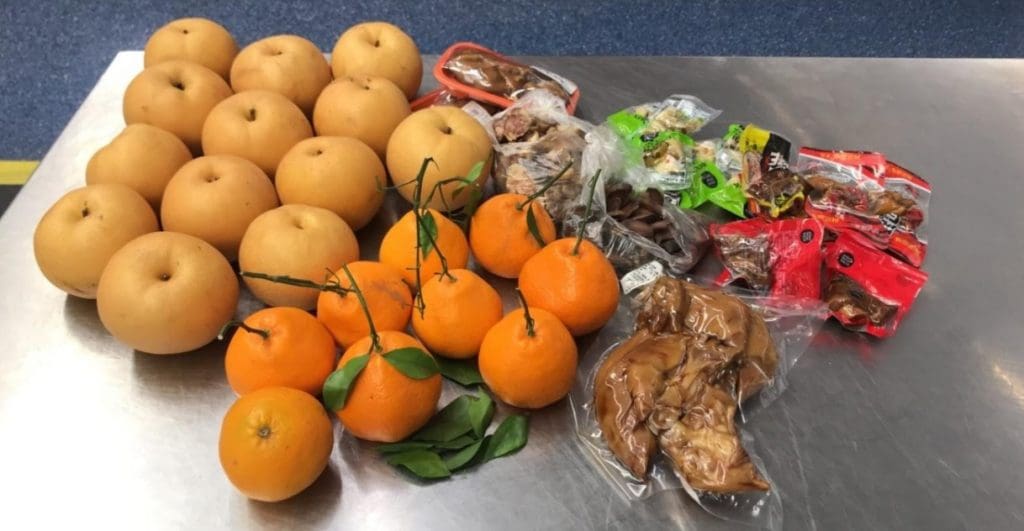
Plant and meat products found by biosecurity detector dogs at Australia’s border.
AUSTRALIA’S peak farmer body has said it will support the Federal Government in determining a sustainable biosecurity funding model after the release of a crucial roadmap document today.
The Commonwealth Biosecurity 2030 document was released today as part of the Australian Government’s roadmap to build a stronger, smarter biosecurity system through to 2030.
The Federal Government has said Commonwealth Biosecurity 2030 will form the basis for engagement with its stakeholders to develop annual action plans to deliver the roadmap and a national biosecurity strategy.
Producers can click here to give your feedback on Commonwealth Biosecurity 2030 and state how they would like to be engaged in the development of the national biosecurity strategy and annual actions plans. Feedback closes on 30 June 2021.
Secretary of the Department of Agriculture, Water and the Environment and Australia’s Director of Biosecurity, Andrew Metcalfe, said the document would ensure Australia’s biosecurity system stays ahead of current and growing biosecurity threats.
“We are facing growing biosecurity risks that are becoming more complex and harder to manage, as pests and diseases spread overseas and more cargo and mail arrives in Australia.
“A strong biosecurity system is all that stands between us and these growing risks,” he said.
“Commonwealth Biosecurity 2030 outlines how we will build our future system and keep Australia at the forefront of best-practice biosecurity.
“We’ll do this by focusing on better governance and regulation, improved use of available technology, supporting our people capability, as well as sustainable, effective funding,” Mr Metcalfe said.
Mr Metcalfe said Commonwealth Biosecurity 2030 will “give us strong ongoing commitment from those who play a key role in our biosecurity system, such as industry, government and community.
“It will also support our people capability on the ground, and better use of data and technology so we can work smarter,” he said.
“It gives us a roadmap to establish a regulatory environment that will allow us to respond to the biosecurity opportunities and challenges we face.”
National Farmers Federation chief executive officer Tony Mahar said the NFF welcomed more than $400 million in this year’s Federal Budget for the expansion and modernisation of Australia’s biosecurity system and today’s announcement was another very important development.
“In the document the government has identified nine strategic actions, under five enablers: regulation, governance, technology, people and funding, which will support the NFF goal’s for a world-class risk-based biosecurity system.
“The NFF is particularly interested in the action for a funding and investment model to meet emerging needs,” he said.
“Since the failure of the biosecurity imports levy, the NFF has been looking for a commitment to a long-term, renewable biosecurity funding stream.
“Through appropriate industry consultation, the NFF hopes to support the government in landing on a sustainable funding model,” Mr Mahar said.
“The NFF looks forward to the announcement of the first annual action plan as flagged in Commonwealth Biosecurity 2030 and stands ready to work shoulder to shoulder with all levels of government and industry to ensure our biosecurity system is future-ready.”
Mr Mahar said achieving a risk-based biosecurity system that effectively, efficiently and sustainably protects Australia’s health, economic, environmental and national security interests is essential to protecting Australia’s $62 billion agriculture industry.
Head of Biosecurity at the department, deputy secretary Andrew Tongue, said Commonwealth Biosecurity 2030 also highlighted that a sustainable funding and investment model would be a priority for our future biosecurity system.
“Australia’s biosecurity system relies on partnerships, relationships and involvement from a range of stakeholders across the country.
“To deliver the priorities outlined in Commonwealth Biosecurity 2030, we will use our strong existing relationships to guide annual action plans and work toward a National Biosecurity Strategy,” he said.
“Commonwealth Biosecurity 2030 will guide our response to recommendations from previous reviews, including by the Inspector-General of Biosecurity and the Australian National Audit Office.
“These reviews have highlighted systemic challenges we need to address going forward,” he said.
“As the document outlines, our goal for Australia’s biosecurity system by 2030 captures the critical role it plays for our country.
“We need it to be a risk-based system that effectively, efficiently and sustainably protects Australia against the biosecurity threats of today and tomorrow. “

HAVE YOUR SAY